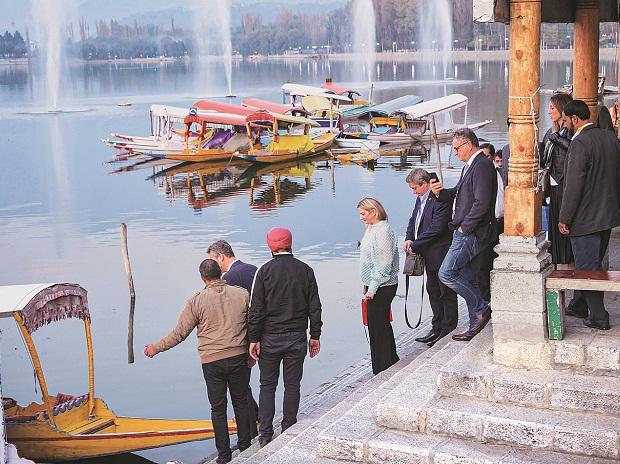The ruling BJP-led NDA Government took a major political decision of amending the Constitution by revoking Article 370 and bifurcating the state into two Union Territories that formally came into being on October 31. Girish Chandra Murmu and RK Mathur have assumed the office of Lieutenant Governors of Jammu & Kashmir and Ladakh respectively.
Though this momentous decision has ruffled many feathers in political circles, it has received a ‘thumbs up’ from the public. Keeping the region under central rule will assist in provision of good governance and speed up the development process. New Delhi has already committed to give full statehood to Jammu and Kashmir when things stabilise.
The credibility of J&K’s ‘mainstream’ political parties in the state had already hit rock bottom since the key players misused the trust that the people of Kashmir reposed on them. Irrespective of which party came into power, corruption and misgovernance continued unabated. The lackadaisical approach towards governance caused immense suffering to the people; even the very basic aspirations of the people remained a distant dream.
While the mainstream political parties are making much hue and cry over abrogation of Article 370 and bifurcation of J&K into two Union Territories, the fact is that they themselves have forced New Delhi to take steps to break their monopoly. Decades of dynastic rule in J&K had created an atmosphere of sycophancy and this prevented capable and dedicated youth from finding their rightful place as leaders of political parties.
To suit their self-serving interests, many have been exploiting the situation by painting a doomsday picture. Inimical forces have been portraying conditions in Kashmir to be inhuman with the locals “caged” by security forces. Weird analogies such as the Nazi movement that resulted in persecution of Jews are being played out.
It is under these circumstances that the Government of India invited a delegation of 27 European Union MPs from nine countries to visit Jammu and Kashmir. This author got an opportunity to personally interact with the members of the delegation and get their views first hand.
After meeting people belonging to different sections of the society in Kashmir the delegation realised that despite getting adequate funds, the local political parties had done nothing for the people, due to which, there had been no development and widespread corruption. While the delegates made it clear that they were not here to interfere with Indian politics, they fully understood that abrogating Article 370 is India’s internal matter. A delegate pointed out that “Kashmir is backward because of the situation. The message we got from the people we met was that there is hope that the change in status will help reverse the situation.” The delegation said that the people of Kashmir want peace and development; they want schools and hospitals and not guns and ammunition.
Expressing concern over Pakistan-sponsored militancy as it is the major factor for instability in Kashmir and is claiming lives of innocent people, one of the members said, “First of all, this visit in my view is of very high importance. In Kashmir, militancy is severe and this is a global question. Police and army have apprised us of how militants have been sent from Pakistan.” The delegation members said that they do not want to see Kashmir becoming another Afghanistan. One delegate said, “Terrorists can destroy a country. I have been to Afghanistan and Syria and I have seen what terrorism has done. We stand with India in its fight against terrorism.”
Newton Dunn from the UK described the visit as an “eye-opener”, adding that the delegation would advocate what they had seen on ground zero. “We belong to a place Europe which is peaceful after years of fighting. And we want to see India becoming the most peaceful country in the world. And for that we need to stand by India in its fight against global terrorism. The delegation expressed hope that the change in status will improve the situation of the state.
Kashmir is a flashpoint between two nuclear countries. Tensions in Indo-Pak relations worry the international community and thus the visit of the EU MPs delegation to Kashmir after New Delhi scrapped Article 370 is timely. Business suffered an estimated loss of Rs 10,000 crore in this current turmoil while tourism and education has been badly affected. Apple industry, which is the main component in Kashmir’s economy, was hit the most due to prevailing situation and has been further harmed by targeted killings of those connected with apple trade industry by militants.
For the people of Kashmir, it’s important to get over petty issues and look at the larger picture so that they are not left behind in their quest for improving their economic status. If Kashmir does not open out to India and onwards to the world, it will be left out of the development loop and will regress by many centuries. The effort of the elected government is to ensure that nothing of this sort happens and that’s why all energies are being channelized towards bringing the region at par with the rest of the country. The idea, in fact, is to see the region surging ahead on the basis of the abundant economic possibilities that are available there.
People of Kashmir are hopeful that members of the European Union delegation after returning to their respective countries will spread a word at different forums that will prove more productive for the cause of Jammu and Kashmir especially the common people of Kashmir Valley so that the festering wound is healed once and for all. Nevertheless, it’s also the foremost duty of every citizen that they should leverage the commitment of the nation to their advantage by rejecting the divisive voices, shun violence and concentrate on issues of development.

